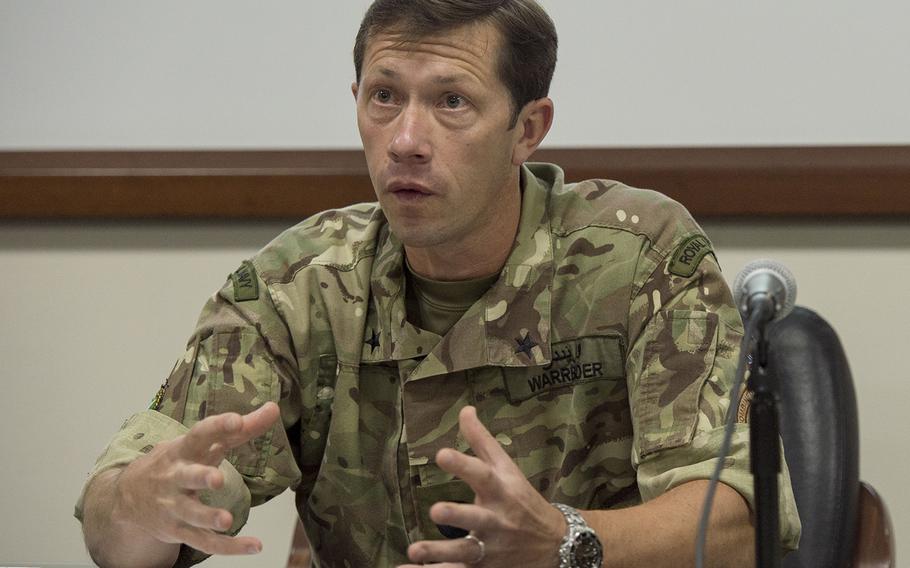
Combined Maritime Forces deputy commander and leader of the exercise Royal Navy commodore William Warrender answers questions about this year's International Mine Countermeasures Exercise during a press conference in Bahrain April 9, 2016. (Chris Church/Stars and Stripes)
MANAMA, Bahrain —The possibility that al-Qaida, Islamic State and other terrorist groups could try to disrupt critical sea lanes in the Middle East is “real,” and maritime powers must focus on mitigating that threat, top naval officials in the region warned on Saturday.
A major focus of this year’s International Mine Countermeasures Exercise, which began Monday, is to address this concern, which could greatly impact international commerce, the commander of U.S. Naval Forces Central Command Vice Adm. Kevin Donegan told journalists.
The global economic impact could be considerable since the region is home to three major choke points for international shipping, including the Suez Canal, Bab el Mandeb strait and the Strait of Hormuz, where nearly 20 percent of the world’s oil transits.
“(Militants) are well aware of the vulnerability of shipping and when its confined to choke points, ports, and channels,” Commodore William Warrender, the British deputy commander of the Combined Maritime Forces told reporters in Bahrain. “And also, the disproportionate media attention that perhaps a spectacular maritime attack would generate.”
One such threat is that al-Qaida has gained control of Yemen’s port city of Mukalla, giving it access to sea lanes that are regularly traveled, Donegan said.
“It’s our great hope that the cease-fire takes hold in Yemen, that we get to a peace agreement in Yemen, and that we can overtime collapse and eventually defeat al-Qaida that exists there so that they don’t have access to that port and don’t have access to maritime commerce,” he said.
Donegan added this helped drive 30 nations to come together for this exercise, which focuses on defensive operations, including mine countermeasures, maritime security and maritime infrastructure protection.
The goal is to have a collective understanding and a will to tackle the problem, said Donegan. Its also to work with the maritime transport companies to understand their vulnerabilities and their role to help mitigate threat.
“No one nation here is big enough to be able to address these sort of problems, but equally, no one nation is so small that their contribution doesn’t matter,” Warrender said. “That is really what all of this is all about, working together collectively, to combat these sort of threats.”
Pirate attacks in the Gulf of Aden and off the Horn of Africa increased in the past decade to reach a record in 2011, 237 ships were attacked and the pirates earned about $2 million in ransom for every vessel.
Since then, attacks have significantly decreased as international navies stepped up anti-piracy patrols. But analysts have warned that that pirates are poised to resume attacks with the help of the al Shabab militant group, which controls parts of Somalia and has links with other terrorist groups in the Middle East.
church.chris@stripes.com Twitter: @CChurchStripes